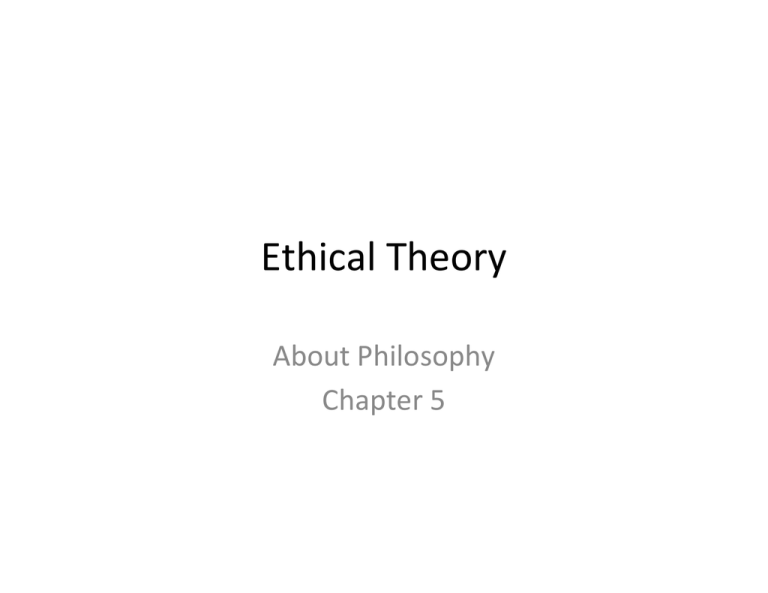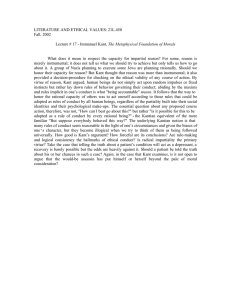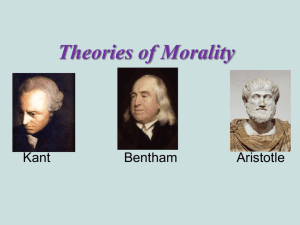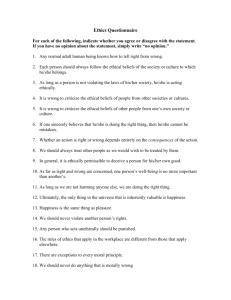Document 14128286
advertisement

Ethical Theory About Philosophy Chapter 5 Ethics • Ethics-­‐the systema8c study of how we ought to act toward ourselves and others; deals with general rules and par8cular cases • Three reasons to think about ethics – To answer both skep8cs and rela8vists – Figure out how to do the right thing, when the right thing is not clear; hard cases – Figure out how to live the “good life” • Morals-­‐principles or habits with respect to right or wrong conduct • Morality-­‐conformity to the rules of right conduct Immanuel Kant • German, 1724-­‐1804; Protestant (Pie8st) • Reason in Ethics – Rejected the no8on that religious doctrine could provide a founda8on for morality – Insisted that moral principles be established on purely ra8onal grounds • Kant’s concerns – Doing what is right in the face of tempta8on to do what is wrong – How to balance the determinism of modern science and free will/ethics Ethical Rela8vism and Skep8cism • Maxims-­‐universal rules • Mores-­‐the customs and conven8ons embodying the fundamental values of a group or society • Ethical Rela8vism-­‐perspec8ve that rightness or wrongness of an act depends on, or is rela8ve to the society in which the act is commiYed • Ethical Skep8cism-­‐perspec8ve that denies that we can have any certainty about what it means to be good or right; doubts that any acts are right or wrong • Ethical Nihilism-­‐perspec8ve that denies that any act is right or wrong • “de gus8bus non disputandem est”-­‐there is not dispu8ng in maYers of taste Kant’s Response to Ethical Rela8vism • Groundwork on the Metaphysic of Morals – Discover, analyze, and defend the fundamental principles of morality – New Golden Rule: “Act only on that maxim through which you can at the same 8me will that it should be a universal law.” • Categorical Impera8ve-­‐a command that orders us to do something uncondi8onally, regardless of our aims or purposes • Universalizability-­‐the Kan8an principle that if a course of ac8on cannot be universally adopted it must be morally impermissible Kant’s “Proof” of the Categorical Impera8ve • Ra8onality of the will – man is capable to make choices on the basis of reason • Infinite worth of persons was ends-­‐in-­‐themselves – Man has a dignity that sets us above everything else in the world – Man is not just a “slave” to his passions/desires • Autonomous nature of reason – Man can legislate the laws to which it submits – Reason itself “writes” the categorical impera8ve • “Kingdom of Ends”: Kant’s dream, an ideal community of upright, responsible, ra8onal men and women who base their ac8ons on universally valid laws that they autonomously lay down for themselves U8litarianism and Jeremy Bentham • U8litarianism-­‐rule that we should try to make as many people as possible as happy as possible – “The Greatest Happiness Principle” – Epicurus (Greek) and Lucre8us (Roman) • Jeremy Bentham – English, 1748-­‐1832 – An Introduc8on to the Principles of Morals and Legisla8on – Most famous modern u8litarian – Believed that when people said “good” and “evil,” they mean “pleasant” and “painful” – More pleasure beYer than less; less pain beYer than more Implica8ons of Bentham’s U8litarianism • Bentham: Principle of U8lity should apply to community; allows him to extract a moral principal from his theory – How do my ac8ons affect me AND others? – Act U8litarianism-­‐each of us should use the principle of u8lity in every act we perform – Governments should legislate by it – Rule U8litarianism-­‐general laws or social norms should be chosen based on u8litarian considera8on, individual acts should be judged according with those laws and norms Strengths of U8litarianism • Explains happiness in easy to understand terms • U8litarian Calcula8on: can transform seemingly impossible problems of moral delibera8on into manageable empirical problems • Bentham hoped his Greatest Happiness Principle could simplify/reform English law Weaknesses of U8litarianism • Is it really that simple? – Can we really quan8fy pleasure and pain? The pleasure and pain of others? – Total happiness vs. maximizing average happiness • Nega8ve moral implica8ons – Can you find a way to add happiness to some/ many without causing someone else pain? – How do you calculate the rights of an individual against the possible benefit of the community or group? What is Virtue Ethics? • Virtue-­‐moral excellence, goodness, righteousness, good character • Virtue Ethics-­‐focuses on character (the kind of person one is) not on behavior (what one does) – Differs from Kant’s concentra8on on duty – Differs from Bentham’s concentra8on on maximizing value Aristotle • Believed that the aim of life was eudaimonia – “eu” (“good”) and “daimōn” (“spirit”) – Usually translated as “happiness” or “well being” – From Defini8ons: The good composed of all goods; an ability which suffices for living well; perfec8on in respect of virtue; resources sufficient for a living creature. • Believed ideal person is someone who made right choices by habit un8l they became second nature – Virtue consists “essen8ally in observance of the mean” (Golden Mean) Rosalind Hursthouse • Modern virtue theorist – Premise 1: An ac8on is right if and only if it is what a virtuous agent would characteris8cally do in the circumstances – Premise 1a: A virtuous agent is one who has, and exercises, certain character traits, namely the virtues – Premise 2: A virtue is a character trait that a human being needs for eudaimonia, to flourish or live well • Possible Cri8cism: Isn’t that a liYle bit circular? Summary: Kant vs. Bentham vs. Hursthouse • Remember the three reasons to “think about ethics” 1. How does first “first principle of conduct” stand up to skep8cs and rela8vists? – Kant: Categorical Impera8ve – Bentham: Principle of U8lity, “Maximize Happiness” – Hursthouse: Be “virtuous” 2. 3. How do you decide “Hard Cases”? – Kant: Does your ac8on pass the test of “universalizability”? – Bentham: U8litarian Calcula8on – Hursthouse: What would a virtuous person do? What ac8on would make me a virtuous person? How to live a “good life”? – Kant: Life devoted to duty deserves happiness – Bentham: Do you maximize your happiness, the happiness of those around you? – Hursthouse: Did you achieve eudaimonia? Summary • Ques8ons: – What makes acts right? – What is theore8cally more fundamental: duty, value, or virtue? Feminist Cri8que of Ethical Theory • Feminism-­‐intellectual, social, and poli8cal movement united in an effort to combat and change social ins8tu8ons and altudes that have oppressed women • Describe the philosophers we have discussed thus far in the course. – Kant: “The virtue of a woman is a beau8ful virtue. That of the the males sex should be noble virtue.” • Basic premise of feminist cri8que – the tradi8on of ethical theory is flawed by patriarchal thinking and oblivious to the experiences and insights of women – Par8cularly concerned with Kan8an tradi8on







